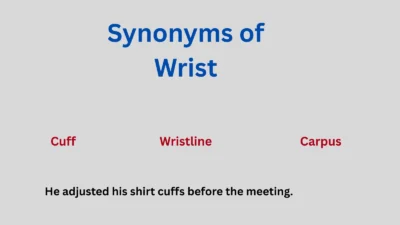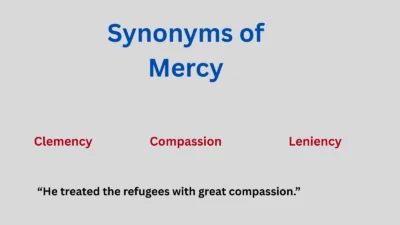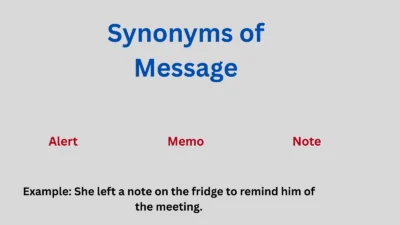Synonyms of overstimulated, such as frazzled, overwhelmed, and overloaded, can help you better express that overwhelming mental or sensory state many people experience.
When someone says they feel overstimulated, what exactly do they mean? Usually, they’re describing a state of mental or sensory overload.
In this article, we’ll break down what the word overstimulated means and provide synonyms for overstimulated or closely related alternatives, each with explanations, examples, and tips on when and how to use them.
What Does Overstimulated Mean?
It’s a frazzled feeling you get when your brain is running on overdrive—too many sounds, sights, emotions, or thoughts happening at once. While the term is often used in neurodiverse contexts (such as with autism or ADHD), it can apply to anyone who’s just feeling too much all at once.
Being overstimulated means that your senses or emotions have been pushed past a comfortable threshold. It’s that moment when:
- Background noise becomes unbearable
- Crowds make you anxious
- Your mind races from one thought to the next
- Emotions hit harder than usual
This can look different depending on the person or situation. It can manifest as anxiety, exhaustion, irritability, or emotional shutdown.
Synonyms & Related Words for Overstimulated (And When to Use Them)
1. Overwhelmed
Meaning: Emotionally or mentally flooded.
Example: She felt overwhelmed by the constant demands of the day.
Use When: You want to emphasize emotional intensity more than sensory input.
2. Frazzled
Meaning: Exhausted or emotionally worn out.
Example: After a long meeting and no lunch break, he looked completely frazzled.
Use When: Describing someone visibly stressed or burnt out.
3. Overloaded
Meaning: Burdened with too much information or responsibility.
Example: My brain is overloaded with deadlines and emails.
Use When: Talking about mental or informational excess.
4. Burned Out
Meaning: Drained from prolonged stress or activity.
Example: After working three straight weekends, she was burned out.
Use When: For long-term emotional or physical exhaustion.
5. Distracted
Meaning: Unable to concentrate due to too much input.
Example: He couldn’t focus on the task—he was completely distracted.
Use When: Attention is fragmented or divided.
6. Jittery
Meaning: Nervous, anxious, or overstimulated physically.
Example: After three cups of coffee, I was jittery and couldn’t sit still.
Use When: Highlighting physical overstimulation, often caffeine-related.
7. Anxious
Meaning: Nervous or worried, often from overthinking.
Example: She was anxious from the constant pressure at work.
Use When: Emotional response is the main concern.
8. Flustered
Meaning: Confused and nervous under pressure.
Example: He got flustered trying to explain himself to the interviewer.
Use When: Stress results in awkwardness or poor performance.
9. Rattled
Meaning: Emotionally shaken or thrown off.
Example: The loud crash left him rattled and jumpy.
Use When: Something unexpected triggers emotional disarray.
10. Unnerved
Meaning: Emotionally unsettled or shaken.
Example: The horror movie unnerved her for hours.
Use When: Discomfort comes from fear or creepiness.
11. Tense
Meaning: Feeling tightly wound or uneasy.
Example: The tense atmosphere made everyone speak in whispers.
Use When: Emotion is bottled up or ready to explode.
12. Exhausted
Meaning: Completely drained of energy.
Example: After the party, I was mentally and physically exhausted.
Use When: You want to emphasize depletion.
13. Irritable
Meaning: Easily annoyed, often from overstimulation.
Example: Noise made him irritable after a long day.
Use When: Overload manifests as crankiness.
14. Disoriented
Meaning: Confused or unable to focus.
Example: She was disoriented after waking up to flashing lights.
Use When: Overstimulation leads to spatial or mental confusion.
15. Panicked
Meaning: In a state of sudden fear or anxiety.
Example: He panicked when the alarms went off.
Use When: Describing a fight-or-flight reaction.
16. Overexcited
Meaning: Too eager or thrilled, to the point of restlessness.
Example: The kids were overexcited from all the sugar.
Use When: Energy levels are too high, especially with children.
17. Hyper
Meaning: Excessively energetic or emotionally charged.
Example: He gets hyper when he skips his ADHD meds.
Use When: There’s an almost raving intensity.
18. Stirred Up
Meaning: Agitated or emotionally activated.
Example: The heated debate stirred up old emotions.
Use When: Emotions are resurfacing or bubbling over.
19. Restless
Meaning: Unable to relax or be still.
Example: He felt restless in the noisy café.
Use When: Discomfort leads to movement or agitation.
20. Unfocused
Meaning: Unable to direct attention properly.
Example: I’m too unfocused to finish this report.
Use When: Mental stimulation disrupts productivity.
21. On Edge
Meaning: Anxious or about to snap.
Example: She’s been on edge since the accident.
Use When: Stress is lingering and visible.
22. Stressed Out
Meaning: Under extreme emotional pressure.
Example: I’m too stressed out to deal with one more thing today.
Use When: You want a casual, everyday phrase.
23. Zoned Out
Meaning: Mentally checked out due to overload.
Example: He zoned out during the meeting—it was just too much.
Use When: Someone has mentally “left the building.”
24. Mind-Blown
Meaning: Overwhelmed, usually by amazement or surprise.
Example: The special effects totally mind-blown me.
Use When: Overstimulation is from awe or novelty.
25. Emotionally Drained
Meaning: Tired from too many emotional ups and downs.
Example: After the funeral, she felt emotionally drained.
Use When: Emphasizing emotional fatigue.
26. Hyperaware
Meaning: Extremely sensitive to surroundings.
Example: He was hyperaware of every sound in the room.
Use When: Describing heightened senses, often in trauma or anxiety.
27. Bombarded
Meaning: Attacked with too many stimuli or demands.
Example: She felt bombarded by texts and notifications.
Use When: The source of overstimulation is external and relentless.
28. Spun Out
Meaning: Spiraling mentally or emotionally.
Example: After the confrontation, he spun out.
Use When: Emotional chaos or overthinking is at play.
29. Triggered
Meaning: Emotionally reactive due to past trauma or sensitivity.
Example: The loud noise triggered a panic response.
Use When: Overstimulation leads to trauma-related reactions.
30. Freaked Out
Meaning: Lost control emotionally or mentally.
Example: I freaked out when I saw the bill.
Use When: Casual or dramatic overreaction is being described.
How to Choose the Right Word
When deciding which synonym to use, consider:
- The source of stimulation
- Sensory? → Hyperaware, jittery, bombarded
- Emotional? → Triggered, overwhelmed, emotionally drained
- The tone you want
- Formal? → Overloaded, disoriented, anxious
- Informal or conversational? → Freaked out, zoned out, spun out
- The intensity of the feeling
- Mild? → Flustered, distracted, restless
- Intense? → Panicked, burned out, rattled
- Cultural or emotional context
- In neurodivergent or trauma-aware contexts, words like triggered, overstimulated, and hyperaware should be used with care and respect.
- In casual writing, expressions like stressed out or frazzled are relatable and less clinical.
Conclusion:
If you’re describing a character in your novel or writing an email to explain why you need a break, using the right synonym of overstimulated helps you communicate with clarity and nuance.
Choose based on what’s causing the overload, how intense it is, and what tone fits your situation.
With this vocabulary toolkit, you’ll be better equipped to express what’s going on inside your head—and connect more authentically with your readers or listeners.





